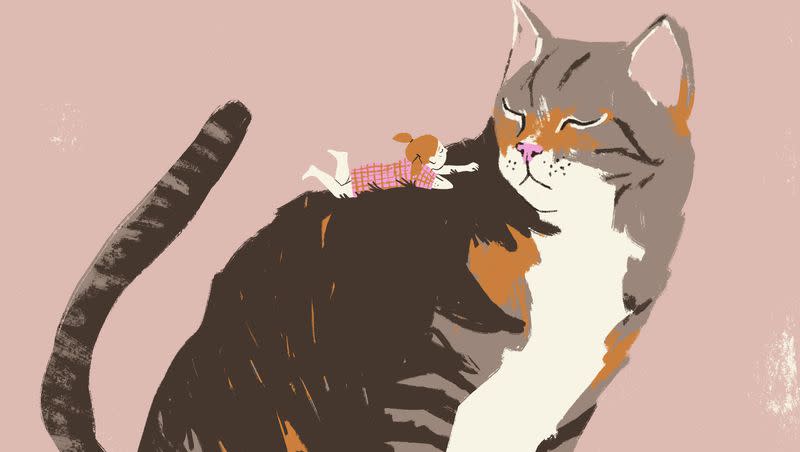Perspective: The nostalgia of a childhood pet

On the kitchen floor, I’m crying with a cat. A cat I’ve spent 14 years with, who has been with me through the death of a parent, through breakups and a broken bone and the growing pains in between, through the blue-sky highs and trenched-in lows of my childhood and adolescence. This cat has done more for me than he will ever understand.
But he has run out of time. He knows it and I know it, and I’m not ready to say goodbye to my friend. You know when you add a pet to your family that you will, more often than not, outlive them. But as a fifth grader, holding a wriggling kitten in my hands, I don’t think I fully understood the mortality of my new companion. But our childhood pets don’t stop giving to us, even when they die. Everything they give us in their lives, we carry into adulthood, like a security blanket, through the power of nostalgia.
Just like how a Carpenters song or the smell of burnt chocolate chip cookies evoke memories and warm feelings from my past, pets carry a similar weight of memories around with them. Even when they are gone, triggering a memory linked to a childhood pet can launch us down a nostalgic slide. This experience can help us combat loneliness, a problem many Americans are facing today in the wake of the loneliness pandemic.
The feeling of nostalgia has been explored by poets and researchers alike through the ages and is defined as a longing, yearning or wistful affection for the past. On a 2019 podcast episode of “Speaking of Psychology,” produced by the American Psychological Association, Krystine Batcho, a professor of psychology at Le Moyne College and a licensed psychologist, says that “nostalgia is an emotional experience that unifies.”
“One example of this is it helps to unite our sense of who we are, our self, our identity over time. Because over time we change constantly; we change in incredible ways. ... Nostalgia, by motivating us to remember the past in our own life, helps to unite us to that authentic self and remind us of who we have been and then compare that to who we feel we are today.”
The nostalgia of a childhood pet works in two ways. The memories with our pet become shared memories with our family members that can strengthen bonds and group connection as we reminisce together. This unifying experience removes us from situations of isolation and give us a sense of community.
Related
As Batcho explains, this unifying can also work to connect us with our past selves by stimulating “memories of the times when we were accepted and loved unconditionally.” In a childhood with trauma, stress or unstable attachments, pets can give us some of that missing stability, security, emotional safety and love. Arthur Brooks, writing for The Atlantic, says that “nostalgia is a defense response to unhappiness, one that brings relief from a negative mood.” Even after childhood, those of us who grow up with a pet have a wealth of memories that can link us to past feelings of self-worth and unconditional love to help us get through hard times in the present.
The benefits of an animal companion on a child’s formation of nostalgic memories can last through childhood into adulthood. Fourteen years of nostalgic memories with my cat will always be there for revisiting, even though the days of building memories are over. Those memories smoothed over difficult periods of my childhood by reliably sprinkling funny or comforting moments with my cat throughout periods of hardship, and they tether me to my siblings and my parents through shared nostalgia.
If you are facing the loss of a beloved childhood companion, nostalgia is a gift that allows your positive memories to benefit you throughout your life and connect you to family, friends and new acquaintances who can relate to your experiences. “In the beginning, when we’re very young,” Batcho says, “(nostalgia is) part of what bonds us to the most important people in our life, our parents, our siblings, our friends. As we go through life, it can broaden out and extend to a wider sphere of the people we interact with. It’s a social connectedness phenomenon and nostalgia is in that sense a very healthy pro-social emotion.”

